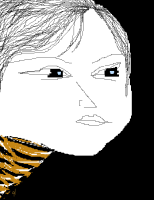"Break
the Rules - Forgive Quickly - Kiss Slowly - Love Truly - Laugh
Uncontrollably"

.png)
Mime across america
a d i v i n e c o m e d y d e d i c a t e d t o a l l c h i
l d r e n o f a l c o h o l i c s
created . choreographed . performed
by
Lani Picard
"No man, for any considerable period, can wear one
face to himself, and another to the multitude,
without finally getting
bewildered as to which may be the true."
Nathaniel Hawthorn, The Scarlet Letter, 1850
Alcoholism is a disease baffling and devastating humanity.
To those who know, hear and understand, the silent screams are deafening
-
resounding from every corner of the globe.
Lani Picard, Silent Screams, a mimo-drama, 1999: a documentary
for Sundance Film Festival
MIME ACROSS AMERICA
During May of '97, masked in gold, I began a
peaceful crusade for all children of
alcoholics by performing the first mimo-drama outside the White House.
The first day of June, I continued dancing my spirit-trek in 'mimo'
across the country
from the shores of the Atlantic to the Pacific
coast carrying my story of hope for humanity entitled,
Odyssey
of Andromeda, Cosmic Crusader, to Steven Spielberg in Los
Angeles.
Ending my journey with a performance of Panther in a
Glass Cage
outside the Los Angeles Museum of Art on Miracle Mile,
I witnessed a
'love-starved' country paralyzed by fear, suspicion, ridicule, and
denial.
Deeply saddened, but not surprised, this real motion picture validated
what I had already known to be true -
my crusade had just begun.
There is hope and recovery!
|
The following facts alone give pause and reason on the subject:
In the US, twenty million children are experiencing
physical, verbal and emotional abuse from parents
In a chaotic, dysfunctional family, the lack of external
control through consistent loving discipline results If any of these questions sound familiar, a 12 step recovery program might help:
1. When difficulties occur, do you need someone to blame
even if it is yourself?
There are some general characteristics which seem to crop up
again and again in the adult children of alcoholics.
Knowledge is power when we can recognize certain truths
about ourselves or others,
Adult children of alcoholics/addicts guess at what normal
behavior is, not realizing that "normal" is a myth.
Children of alcoholics/addicts have difficulty following
projects through,
Adult children of alcoholics/addicts often lie, when it
would be just as easy to tell the truth.
Adult children of alcoholics/addicts judge themselves
without mercy. Adult children of alcoholics/addicts have a hard time having fun.
Adult children of alcoholics/addicts take themselves very
seriously.
Children of alcoholics/addicts have trouble with intimate
relationships.
Adult children of alcoholics/addicts overreact to situations
over which they have no real control.
Children of alcoholics/addicts constantly seek approval and
affirmation from others.
Adult children of alcoholics/addicts have a hard time
feeling comfortable.
Adult children of alcoholics/addicts are either
irresponsible, or incredibly responsible.
Adult children of alcoholics/addicts are intensely loyal
even when it is obvious that their loyalty may be misplaced.
Adult children of alcoholics/addicts are impulsive.
There is always cause for hope. |
ALCOHOL'S PROMISE
I am more powerful than all the combined armies of the world.
I have destroyed more people than all the wars of the nations.
I have caused millions of accidents and wrecked more homes than all the
floods, tornadoes and hurricanes put together.
I am the world's slickest thief, I steal billions of dollars each year.
I find my victims among the rich and poor alike, the young, the strong
and the weak.
I loom up to such proportions that I cast a shadow over a field of
labor.
I am relentless, insidious and unpredictable.
I am everywhere; in the home, on the street, in the factory, in the
office, on land and in the air.
I bring sickness, poverty and even death.
I give nothing and take all.
I am your worst enemy.
I am alcohol.
I am patient and I am waiting.
~Anonymous~
LINX
Adult Children
of Alcoholics
Meetings, Recovery Rooms, Chat Rooms and Daily
Meetings
BE YOUR DREAM